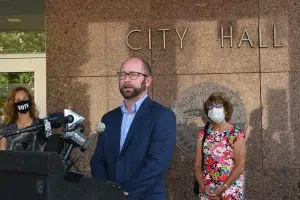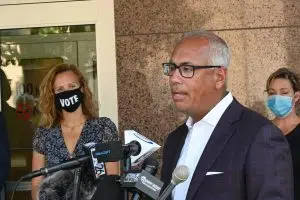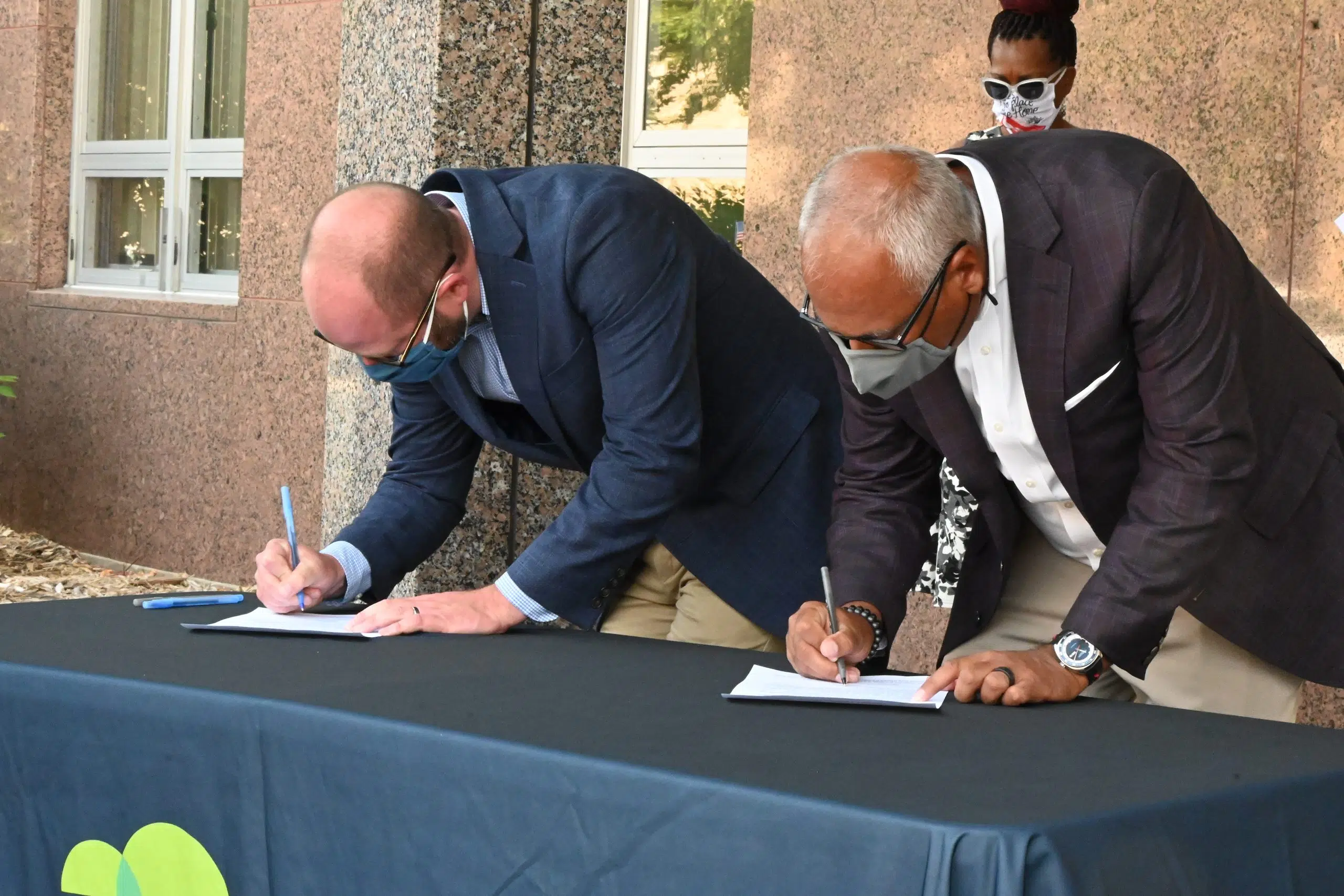GREEN BAY, WI (WTAQ) – The City of Green Bay is signing on to a statewide declaration deeming racism as a public health crisis.
The Green Bay City Council unanimously passed a request to sign on to the Wisconsin Public Health Association’s Racism as a Public Health Crisis in Wisconsin declaration last week. It was signed by Mayor Eric Genrich and other leaders of community organizations during a press briefing on Wednesday.
“It’s a really powerful first step to take for us as a city and as a community with our partner organizations, to recognize the fact that that racism is a a real and true and imminent public health threat,” Genrich said. “You don’t want to over exaggerate its impact, but I think it sets us on the right path. I’m just really encouraged to be on this journey with so many powerful community organizations in the city of Green Bay.”

Green Bay Mayor Eric Genrich speaks to the media outside of city hall. (PHOTO/WTAQ News)
The declaration has reportedly been in the works for several years, but arrives at an interesting time – amid protests and riots across the state in the wake of the shooting of Jacob Blake in Kenosha.
“The timing is apt, unfortunately, given recent actions in Kenosha and other communities,” Genrich said. “It re-emphasizes the importance of, again, telling the truth. Speaking very clearly, not just for people of color, but for this community as a whole – saying this is a real problem for us, we need to be honest about it and and work through this together.”
But many may ask – how exactly does racism or discriminatory acts influence public health? Research reportedly shows a close tie between those actions and negative impacts on the health of communities of color.
“Racism contributes to increased incidence of heart disease diabetes and cancer…In Brown County, white citizens live on average 16 years longer than black citizens and 18 years longer than our Hispanic citizens…In Wisconsin, the infant mortality rate for infants of non-Hispanic black women is the highest in the nation,” said Wello Executive Director Natalie Bomstad. “In 2019, the Wello resident health and well-being survey found that Brown County non white residents reported lower well being in all categories compared to their white counterparts.”
Wello is working with local leaders on a measurement tool that will track the impact of steps – like the declaration – on the well-being of people of color across the community, as well as the community as a whole. They believe it’s not possible to achieve high levels of well being in Brown County if anyone is left behind.
“Hundreds of studies document the negative impact of stress caused by historical and continued trauma stereotyping and prejudice against people of color. Racism also leads to differences in treatment across many of our systems including healthcare, housing, and education,” Bomstad added.
That’s why Prevea Health CEO Dr. Ashok Rai also signed on to the declaration.
“Having trained in the state of Wisconsin, I’ve seen the effects of racial disparities in healthcare since the first day I entered a hospital,” Rai said. “As health care providers we need to do more than just admit it’s a problem. We need to be part of that solution.”
Rai says the health care industry has had a magnifying glass placed over it for the past six months, due to the pandemic. He claims they’ve seen racial disparities in deaths, as well as access to testing and healthcare – all things he says they need to address.

Prevea Health CEO Dr. Ashok Rai speaks to the media outside of Green Bay City Hall. (PHOTO/WTAQ News)
“We need to do more than just identifying that it’s a problem. We need to identify sources and resources for treatment of the trauma created through systemic racism in our country, in our state, and in our city,” Rai said. “The mental abuse that happens at a very young age carries forward to adulthood, and increases mental health issues from anxiety to depression, and sometimes even worse. All of which stem from racism and the exposure that our young children have…[our job] is truly identifying the trauma that a person of color goes through from the day they are born in the United States to the day they die because of the color of their skin.”
Oftentimes, people can question whether racism actually exists, particularly in their own communities. Other local leaders shared their personal experiences with that controversy.
“You can see discriminatory acts but you really can’t see racism. People who are the victims of it – people don’t believe them. People are in denial about its existence,” Greater Green Bay YWCA CEO Renita Robinson told WTAQ News. “It’s work to constantly have to be saying ‘No, I didn’t make that up. That actually happened to me,’ and to be wondering if the reason people aren’t believing you is because you’re black.”
Robinson said it took several years for one of her closest friends to believe some of the actions that were directed towards her on a daily basis. Whether it was direct or indirect actions that made her uneasy or caused some form of trauma.
“A lot of people of privilege will say ‘But maybe it wasn’t really that. You should consider this. Why don’t you look at it this way?’ and I’m always like ‘No. Why don’t you look at it the way I see it?’” Robinson argued. “It’s all those things that you can’t see that people really take issue with and just assume that ‘No, that can’t be so. You’re making that up’…Whenever you tell someone that they are not experiencing something that they know that they are experiencing because they were there – it’s work for them. That dismissiveness is at a cost to people.”

YWCA CEO Renita Robinson Wisconsin Public Health Association’s Racism as a Public Health Crisis in Wisconsin declaration. (PHOTO/WTAQ News)
The biggest part for Robinson – is the small things. Things that people often don’t think about when they think about their own lives versus what others experience.
“There are little big things that really affect the quality of people’s lives, that people who don’t have to think about that have no clue about,” Robinson explained. “It’s a very different experience than people who don’t have to worry about whether their children are going to be safe or pulled over or shot at a traffic stop. Some people don’t have to worry about that.”
Green Bay joins the City of Appleton, City of Madison, and Milwaukee County as the only municipalities to sign on.








